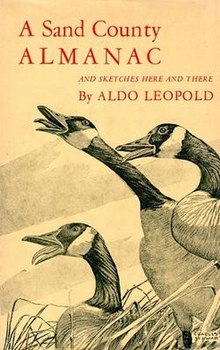Sand County Almanac

First edition
|
|
| Author | Aldo Leopold |
|---|---|
| Cover artist | Charles Schwartz |
| Country | United States |
| Language | English |
| Subject | Ecology, Environmentalism |
| Publisher | Oxford University Press |
|
Publication date
|
1949 |
| Pages | 240 pp |
| ISBN | |
| OCLC | 3799061 |
A Sand County Almanac: And Sketches Here and There is a 1949 non-fiction book by American ecologist, forester, and environmentalist Aldo Leopold. Describing the land around the author's home in Sauk County, Wisconsin, the collection of essays advocate Leopold's idea of a "land ethic", or a responsible relationship existing between people and the land they inhabit. Edited and published by his son, Luna, a year after Leopold's death, the book is considered a landmark in the American conservation movement.
The book has had over two million copies printed and has been translated into twelve languages. It has informed and changed the environmental movement and stimulated a widespread interest in ecology as a science.
A Sand County Almanac is a combination of natural history, scene painting with words, and philosophy. It is perhaps best known for the following quote, which defines his land ethic: "A thing is right when it tends to preserve the integrity, stability, and beauty of the biotic community. It is wrong when it tends otherwise." The original publication format was issued by Oxford University Press in 1949. It incorporated a number of previously published essays that Leopold had been contributing to popular hunting and conservation magazines, along with a set of longer, more philosophical essays. The final format was assembled by Luna Leopold shortly after his father's death, but based closely on notes that presumably reflected Aldo Leopold's intentions. Subsequent editions have changed both the format and the content of the essays included in the original.
In the original publishing, the book begins with a set of essays under the heading "Sand County Almanac," which is divided into twelve segments, one for each month. These essays mostly follow the changes in the ecology on Leopold's farm near Baraboo, Wisconsin. (There is, in fact, no "Sand County" in Wisconsin. The term "sand counties" refers to a section of the state marked by sandy soils). There are anecdotes and observations about flora and fauna reactions to the seasons as well as mentions of conservation topics.
...
Wikipedia
